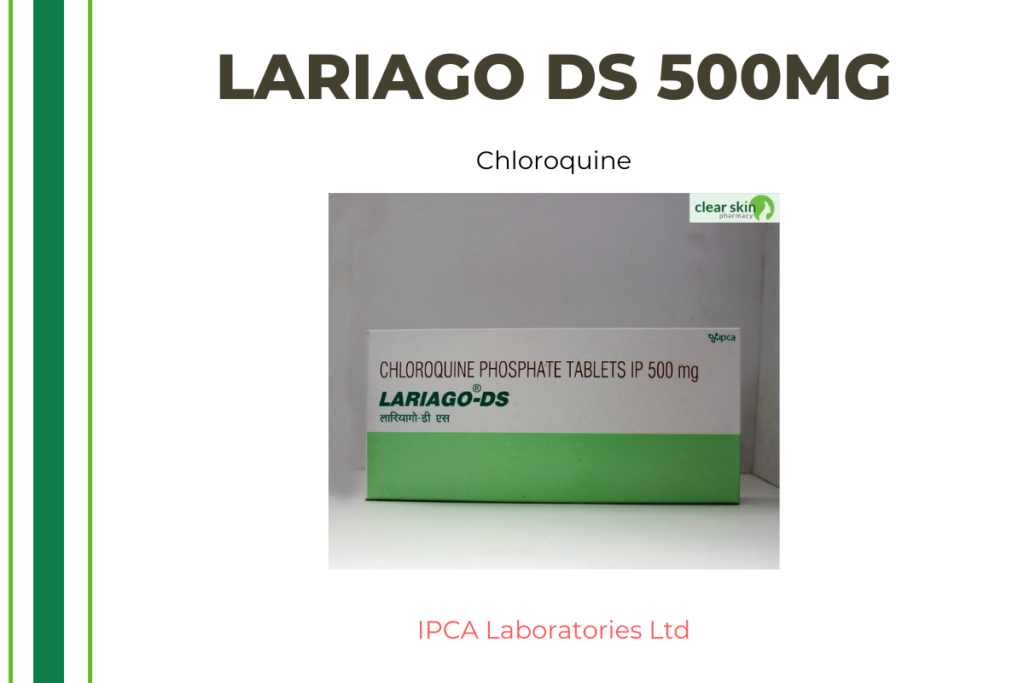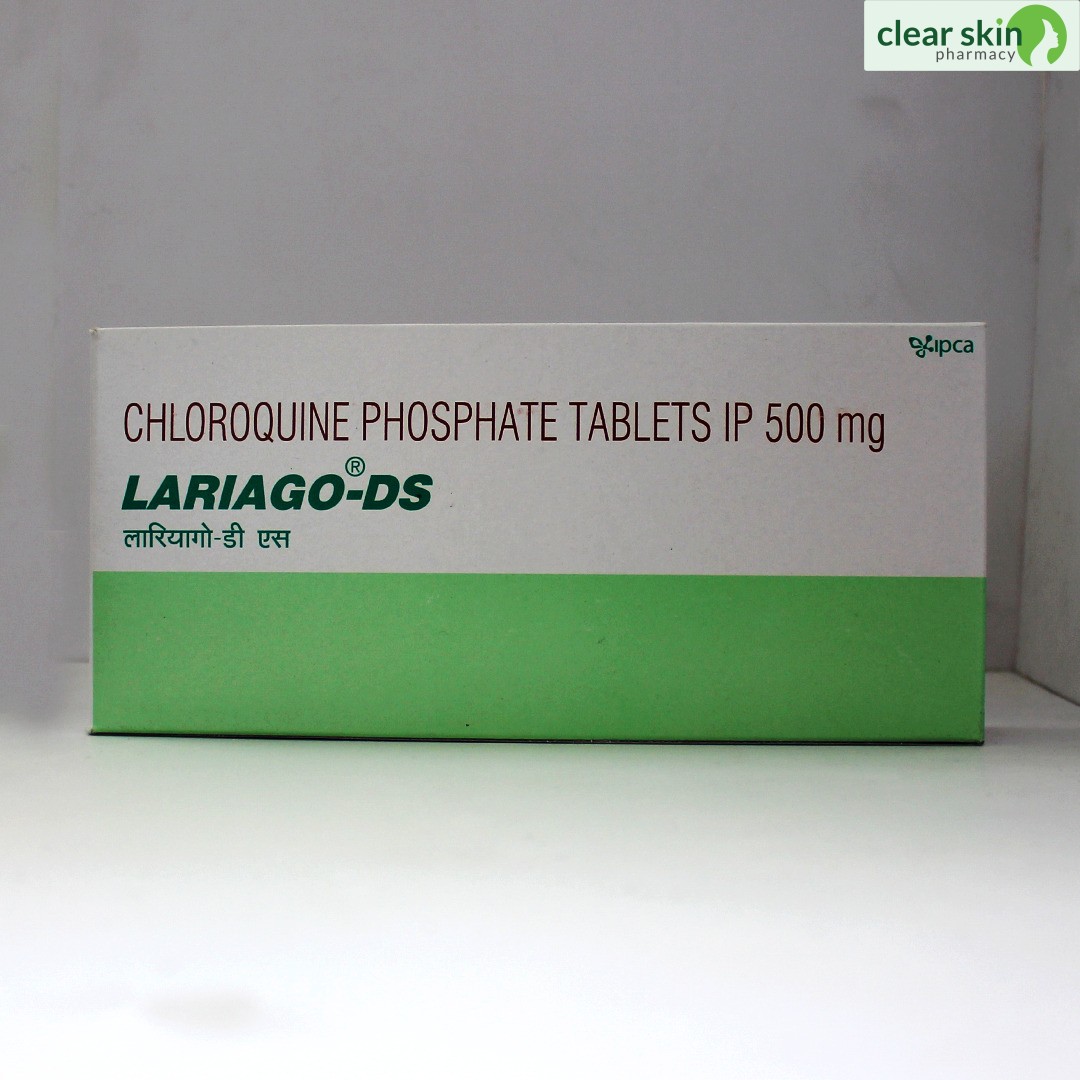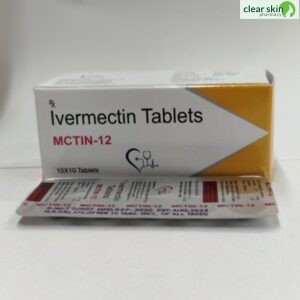About Lariago-DS
Lariago-DS Tablet 5s is a member of the quinoline drug class, which is typically employed for the treatment of malaria. Lariago-DS Tablet 5s provides some protection (prophylaxis) against malaria when individuals travel to areas where malaria is present. Plasmodium vivax, Plasmodium ovale, and Plasmodium malariae are all resistant to it. The malaria parasite Plasmodium falciparum is resistant to Lariago-DS Tablet 5s. In addition, it alleviates intestinal amoebiasis and rheumatoid arthritis (arthritis).
The Lariago-DS Tablet 5 contains chloroquine, which destroys malarial parasites like Plasmodium and prevents them from producing the harmless heme metabolite hemozoin. Malaria causes parasites by destroying the red blood cell component heme. The parasite is detrimental to Lariago-DS Tablet 5 because it inhibits heme decomposition. It destroys the parasitic form that resides in the red blood cells of the liver.
Use Lariago-DS Tablet 5’s as directed by your physician, preferably with a meal to reduce gastrointestinal discomfort and at regular intervals throughout the day, for optimal results. The dose of Lariago-DS Tablet 5’s may vary based on your health and the severity of your illness. Before traveling to a region prone to malaria, it is recommended that you complete your treatment and take it for four weeks. Vomiting, nausea, hair loss, and skin irritation are common side effects of Lariago-DS Tablet 5. Everyone does not have to experience the above adverse effects. Consult a physician if you experience any pain.
Inform your physician if you are allergic to chloroquine or if you have kidney or liver problems before beginning Lariago-DS Tablet 5’s. Tablet 5 of Lariago-DS should not be taken alone. Using Lariago-DS Tablet 5’s is safe during pregnancy and breastfeeding. Long-term use of Lariago-DS Tablet 5s may endanger the heart and retina of the eyes, resulting in irregular heartbeats and permanent vision loss.
Lariago-DS Tablet 5 is prescribed for rheumatoid arthritis, malaria, and intestinal amebiasis.
The treatment of Covid-19 and Coronoavirus is a secondary application, but it is not approved by the FDA for this purpose.

Medicinal Advantages
Lariago-DS Tablet 5 belongs to the antimalarial drug class, which is used to treat or prevent malaria. The Lariago-DS Tablet 5 contains the quinoline family member chloroquine. It inhibits the parasite’s production of the innocuous heme metabolite hemozoin. The parasite perishes due to the toxin-producing byproducts of hemoglobin metabolism. In addition to treating rheumatoid arthritis, lupus, and amoebic intestinal infections, Lariago-DS Tablet 5’s are also used to treat rheumatoid arthritis and autoimmune diseases such as lupus (amoebiasis).
Utilize Directions
At the beginning of a meal or just before, the tablet should be taken with a full glass of water. Throughout the course, dosages should be evenly spaced. It is neither to be chewed nor pulverized. If you cannot swallow the entire tablet, divide it in half and take each portion separately.
Storage
Place in a cold, dry area out of direct sunlight.
Five Lariago-DS Tablet Adverse Reactions
abnormal heart rate and cadence
a stomachache and nausea (being sick)
Diarrhoea
Appetite reduction
Headache
Liver problems and a cutaneous rash
Recommendations for Drugs
Lariago-DS Tablet 5’s does not work against all malaria strains; therefore, if you feel Lariago-DS Tablet 5’s is not functioning for you, consult your doctor. This prescription has the potential to damage a person’s heart, particularly if they are also taking medications such as the antibiotic azithromycin and anticancer drugs such as tamoxifen. A person should consult a physician if they experience rapid or thumping heartbeats and acute vertigo. This medication should not be taken for an extended period of time, as it may cause irreversible ocular damage, which may result in vision problems. Contraindications to taking Lariago-DS Tablet 5 include heart disease, heart rhythm disorder, diabetes, stomach disorder, quinine allergy, liver or kidney disease, psoriasis, alcoholism, porphyria (a genetic enzyme disorder that affects the skin or nervous system), and glucose-6-phosphate dehydrogenase (G6PD) deficiency. If you are pregnant or nursing, consult your doctor before taking this medication, as it can only be prescribed by a physician.
Interactions Between Medications
Antibiotics (ciprofloxacin, amoxicillin/clavulanate, azithromycin, celecoxib), immunosuppressants (mycophenolate mofetil), antimalarials (proguanil, primaquine, mefloquine, hydroxychloroquine), antianxiety medicine (pregabalin), anti-epileptic (levetiracetam), antacids (esomeprazole), proguan (alprazolam).
Consuming grapefruit or grapefruit juice while taking Chloroquine can significantly increase the blood concentration of the medication.
Individuals with oculotoxicity, blood disease (porphyria), heart disease (arrhythmias), bone marrow suppression, ear disorder (cytotoxicity), seizures, enzyme deficiency (G-6-PD deficiency), liver disease (hepatotoxicity), muscle disorder (myasthenia gravis), and skin disease (psoriasis) should not take Chloroquine without first consulting a physician.
Safety Recommendations
ALCOHOL
Although no significant interactions have been observed between alcohol and chloroquine, imbibing should be avoided when taking chloroquine because it exacerbates adverse effects.
PREGNANCY
During pregnancy, chloroquine should be taken with caution and only if prescribed by a physician.
BREAST FEEDING
It is not recommended to breastfeed while taking Chloroquine because the substance may pass into breast milk. This medication should only be taken on the advice of a physician.
DRIVING
Due to the fact that chloroquine can cause impaired vision, it is best to avoid driving and other activities that require mental acuity while taking it. Therefore, this medication should only be taken after consulting with a physician.
LIVER
In healthy individuals, chloroquine medication is not likely to cause liver damage, but in uncommon instances, it can precipitate a sudden worsening of porphyria. Before consuming Chloroquine, a consultation with a physician is advised.
KIDNEY
Before taking chloroquine, it’s recommended to consult a physician because it can impair kidney function in some individuals.
No habits formed
Diet and Lifestyle Advice
Always take chloroquine with sustenance to prevent gastric irritation.
Proper nutrition can alleviate the weakness caused by malaria.
In order for the patient to accept the meal, it is necessary to allow them to consume small quantities of food on a regular basis.
Increase your intake of fluids and protein to combat weight loss caused by malaria.
The patient must have sufficient rest and a mosquito-free environment in order to recover.
Recommendations
Do not take it if you have had a previous reaction to chloroquine or if you have specific eye disorders affecting the retina. Eye-related concerns should be reported to your healthcare provider.
Additional Information: This item cannot be returned.
Diseases and Conditions Glossary
Malaria is a parasitic infection caused by the Plasmodium protozoan. It is a life-threatening parasitic infection. Plasmodium falciparum, Plasmodium vivax, Plasmodium ovale, and Plasmodium malaria are the four parasites that may induce malaria in humans. It is caused by stings from female anopheles mosquitoes. Malaria pathogens enter the bloodstream through bites from infected insects (the Anopheles mosquito). The parasites then travel to the liver, where they proliferate in the bloodstream. Due to the parasites’ location in the liver, the patient does not experience any symptoms during this time. The parasites then exit the liver and mature within the red blood cells. The red blood cells then rupture, permitting the parasites to transfer to another blood cell. At this stage, the parasites discharge toxic substances into the bloodstream, causing the patient to become ill. Anemia, renal failure, and jaundice are brought on by malaria due to the excessive red blood cell death induced by plasmodium growth within them.
FAQs
Chloroquine should not be administered to individuals who are presently taking an antibiotic (azithromycin) because it can cause serious heart side effects.
No such harmful interaction has been observed in patients taking this medication under the supervision of a physician. Some patients taking Chloroquine may experience eye (retina) damage and a racing pulse, which necessitates periodic doctor visits and checkups.
In addition to malaria, chloroquine is used to treat rheumatic disorders (rheumatoid arthritis), autoimmune disease (lupus), and intestinal amoebiasis.








Be the first to review “LARIAGO DS 500MG 5 Tablets”